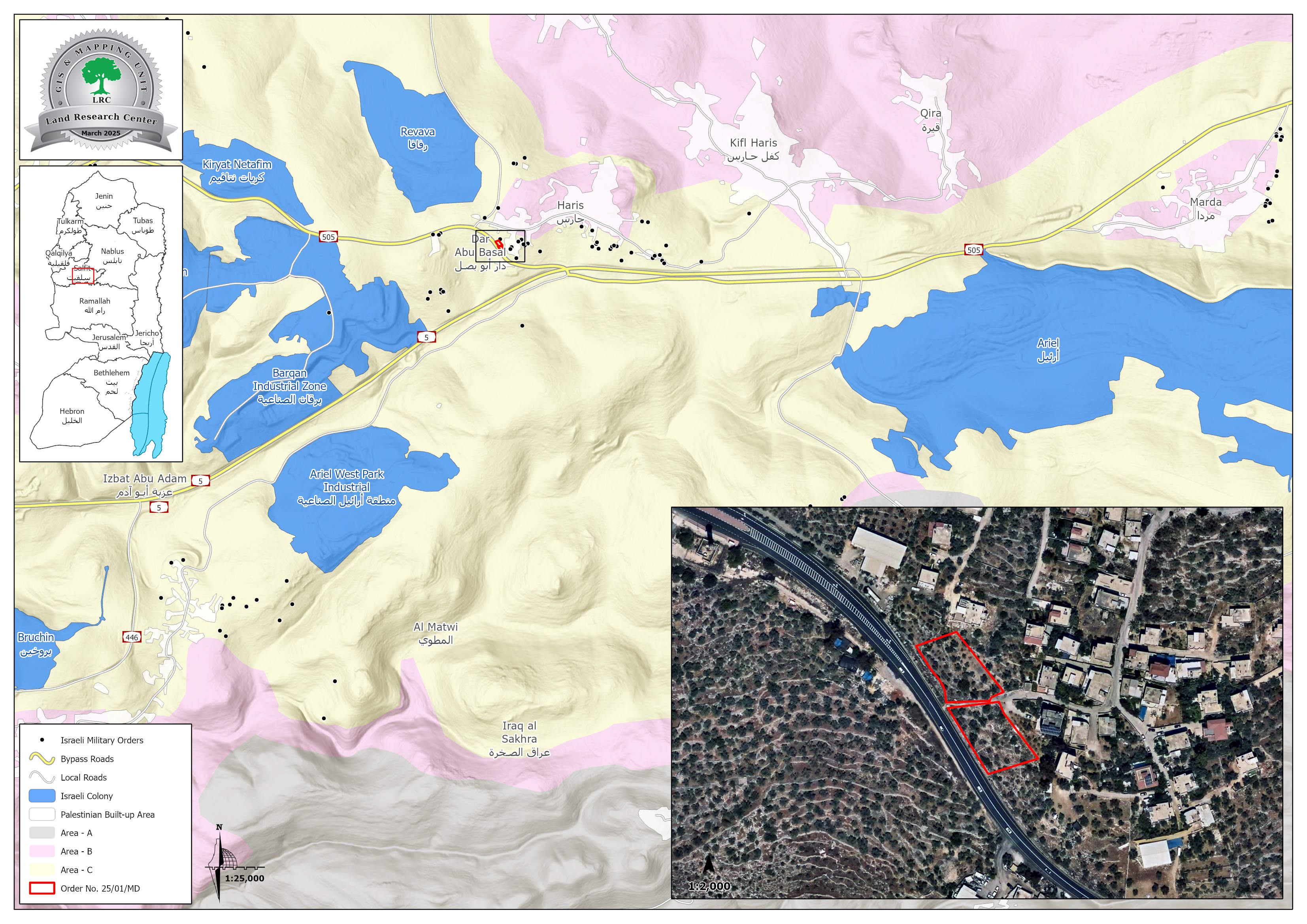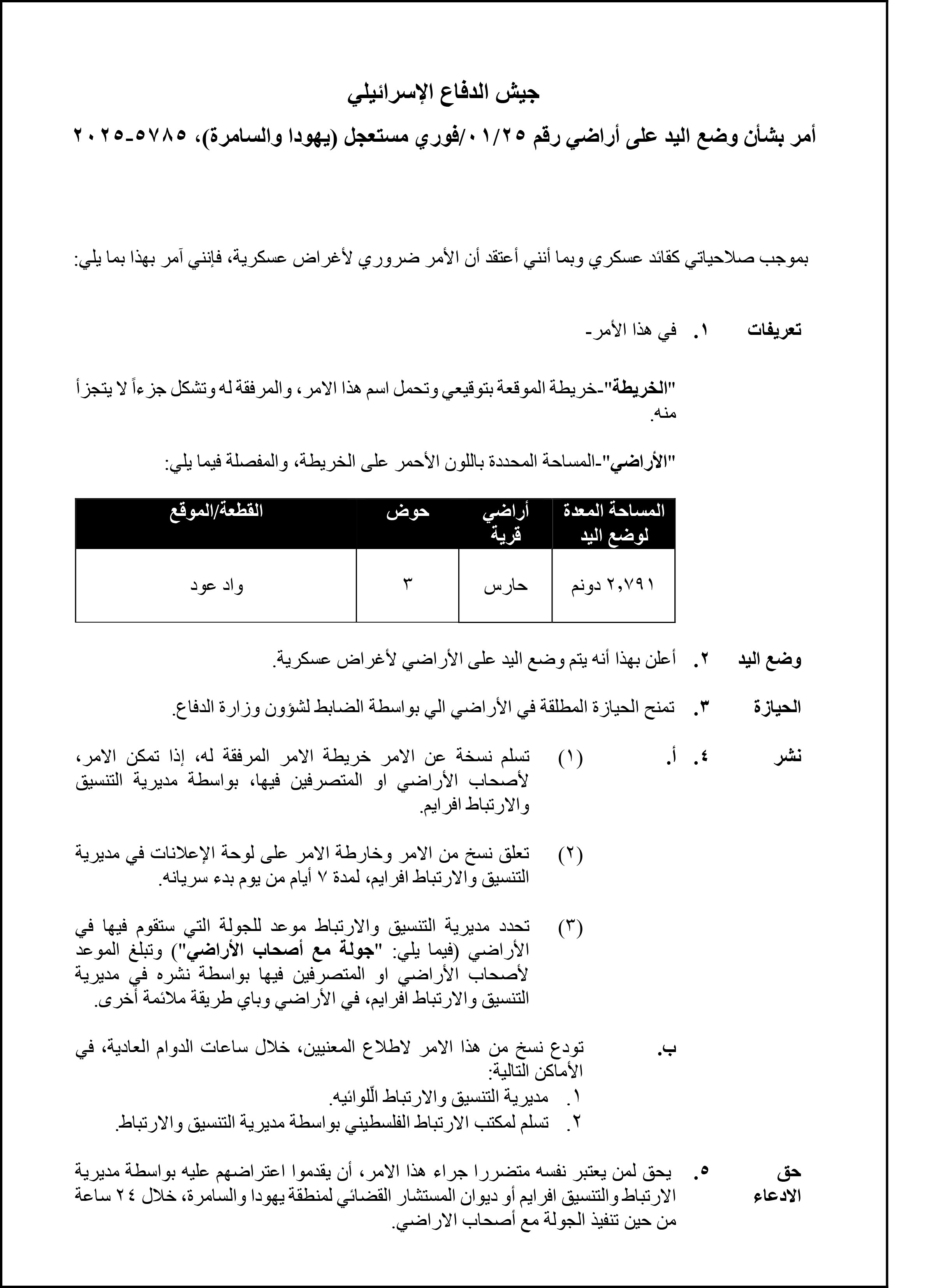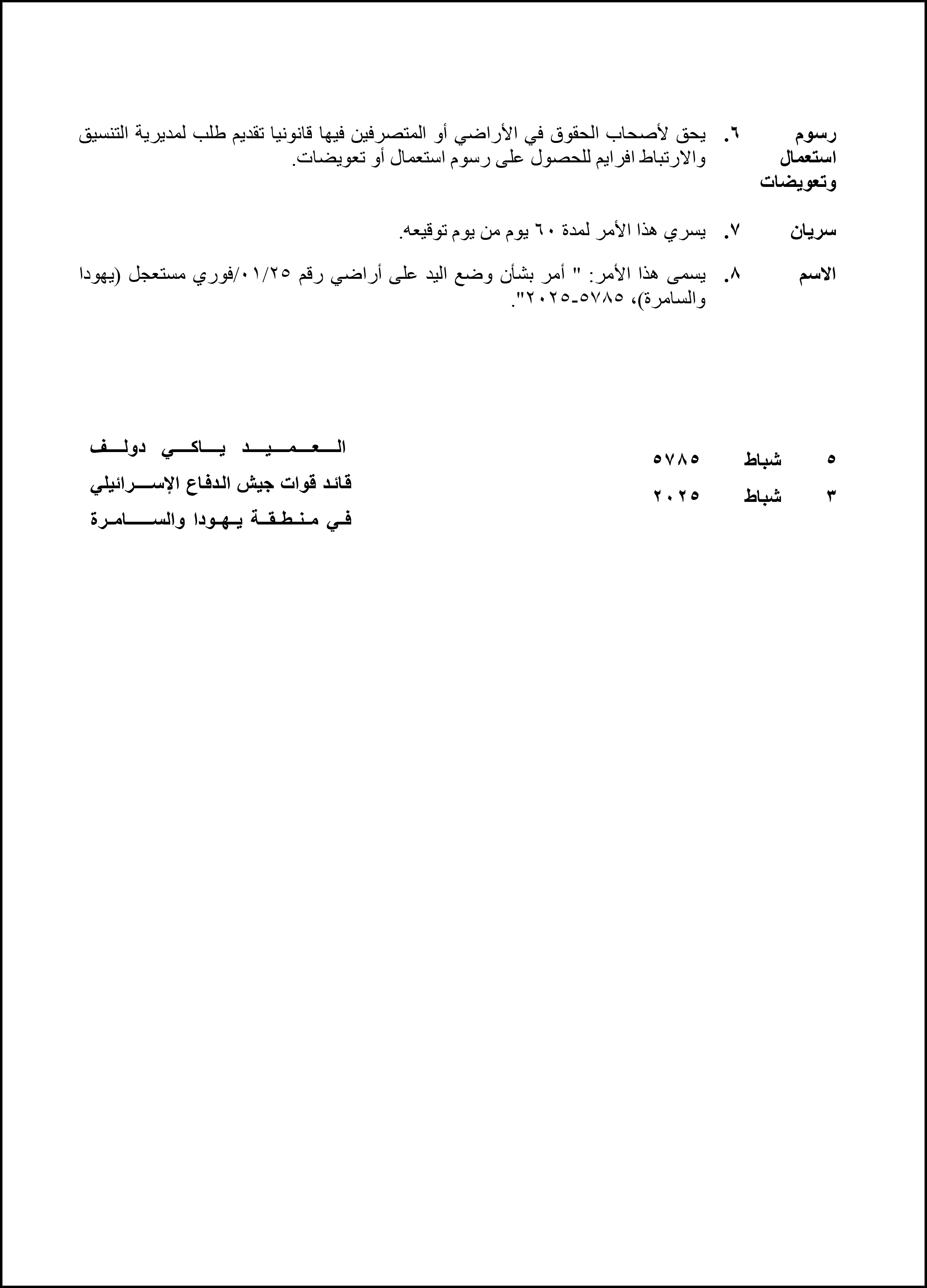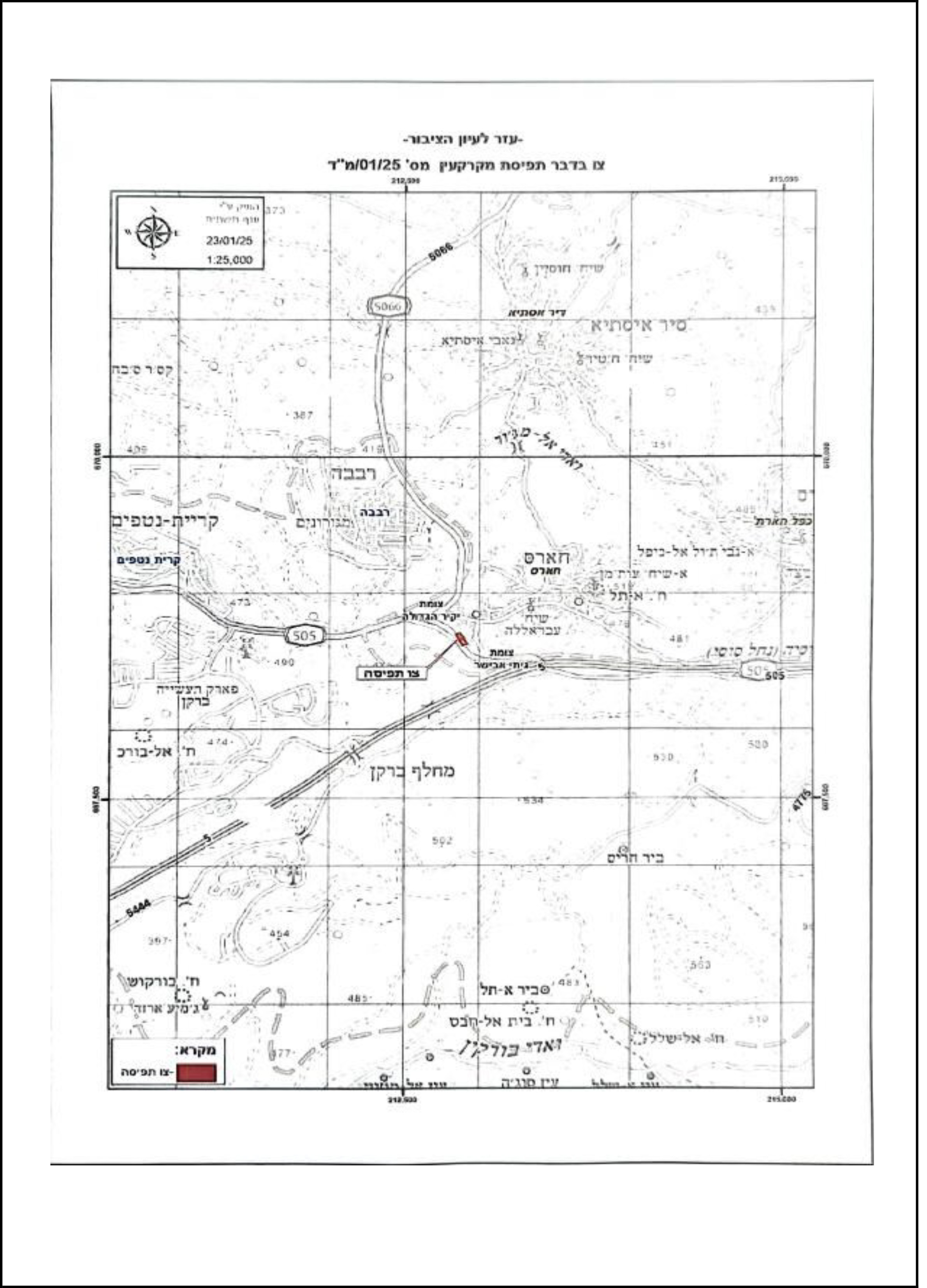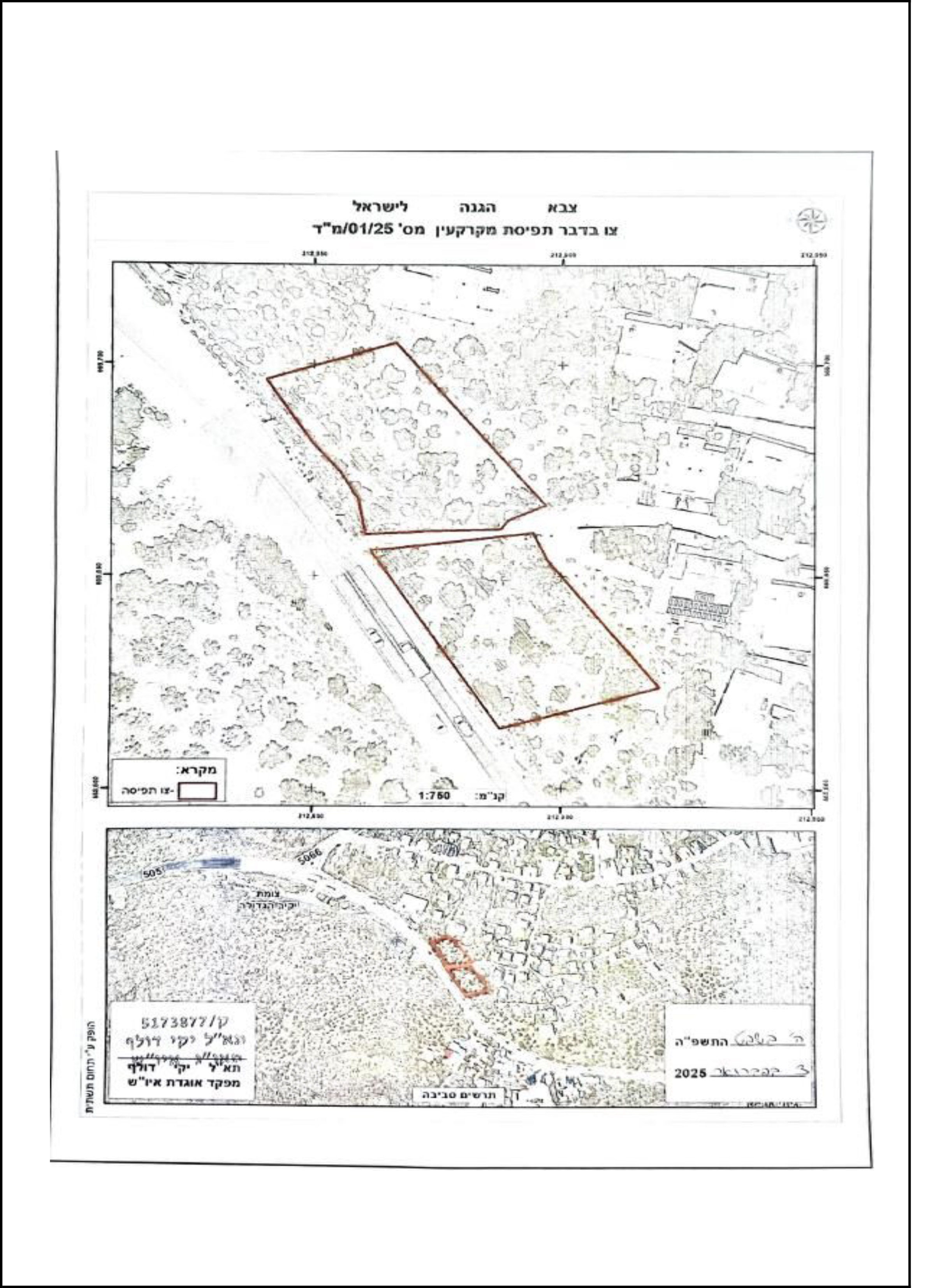The Occupation Issues an Order to Seize Olive-Grove Lands for Military Purposes in the Village of Haris / Salfit Governorate
- Violation: Announcement of land confiscation totaling 2.79 dunums
- Location: Village of Haris, west of the city of Salfit
- Date of Violation: February 5, 2025
- Perpetrator: called Commander of the Israeli Occupation Forces in the West Bank
- Affected Party: Residents of the village of Haris
Description:
On the morning of Wednesday, February 5, 2025, the so-called Commander of the Israeli Occupation Forces in the West Bank, Yaki Dolf, issued an urgent military order titled “Order for the Seizure of Lands No. 25/1 – Immediate and Urgent”. The order entails the seizure of 2,700 square meters (approximately 2.79 dunums) of land in the village of Haris, specifically within Natural Block No. 3, in the Wadi ‘Awad area. The justification given for the order was “urgent security needs.”
These lands are privately owned by several farmers, specifically the heirs of Ahmad Ali Souf and Ali Shamlawi.
According to the military notification, which includes a map outlining the targeted area, the land in question is an olive grove adjacent to Bypass Road No. 505, lying directly next to the village’s houses from the southern side. It appears that the Israeli occupation intends to establish a buffer zone between the village’s homes and the bypass road at the expense of the village’s cultivated lands.
This action reflects a continuing policy of land appropriation under alleged security pretexts, often resulting in the loss of agricultural livelihoods and the erosion of Palestinian land ownership.
Farmer Hadi Ahmad Souf reported the following to the LRC's field researcher:
"We are suffering significantly and visibly from the targeting of our lands by settlers and the occupation army. There is no agricultural plot in the village that hasn’t been heavily targeted. The village's lands lie along bypass roads and are surrounded by several Israeli settlements. All lands owned by farmers here have become the focus of settler aggression—they try to seize and bulldoze them. And today, our own plot of land on the outskirts of the village has become a target through this new order, which means we are no longer allowed to access or benefit from it. This adds another catastrophe for us, as now all of our lands are entirely under threat."
It is worth noting that the village of Haris has become a primary target of the Israeli occupation. The village is now described as devastated amid the escalating struggle over land and ongoing attempts by settlers to Judaize the entire area. Bypass roads, settlements, and military bases collectively dominate the majority of the village’s land, leaving little space or security for its Palestinian residents and further deepening the sense of dispossession and isolation faced by the community.
Village of Haris (1):
The village of Haris is located 6 km west of the city of Salfit, with a total land area of 8,450 dunums, and the built-up area of the village covering approximately 320 dunums. It is bordered to the north by Deir Istiya, to the east by Kifl Haris, to the southwest by Buruqin and Kafr ad-Dik, and to the west by Qarawat Bani Hassan.
According to the Palestinian Central Bureau of Statistics (PCBS) for the year 2017, the village has a population of around 4,137 residents. The main families in the village include: Abu ‘Ata, Dawood, Salameh, Sultan, Shahada, Souf, ‘Awad, Fazaa‘, Qassem, and Kleib.
Haris stands as a living testimony to the bitterness and brutality of the Israeli occupation. The colonial Route 505 was constructed through its fertile agricultural lands, stretching over 4 km and linking the Green Line with the heart of the occupied West Bank—a road that not only cuts through the land physically but symbolically represents the ongoing fragmentation and control of Palestinian territory.
Land Confiscation is a Violation of International Law
The actions taken by settlers in the occupied Palestinian territories—confiscating Palestinian land, establishing outposts, or expanding settlements—constitute a violation of the rights of the Palestinian people and their land, as well as a breach of international laws and norms. Below are the most important provisions from international laws and treaties that prohibit Israeli settlement in Palestinian territories and protect civil and public rights and property in occupied lands, in addition to relevant United Nations resolutions.
Lahai Convention / 1907:
- Article 46: The occupying power is prohibited from confiscating private property.
- Article 55: The occupying power shall be regarded only as an administrator and usufructuary of public buildings, real estate, forests, and agricultural estates belonging to the occupied state. It must safeguard the capital of these properties and administer them in accordance with the rules of usufruct, treating them as private property.
The Fourth Geneva Convention / 1949:
- Article 49: The occupying power shall not deport or transfer parts of its own civilian population into the territory it occupies, nor undertake any actions that would lead to demographic changes in that territory.
- Article 53: The occupying power is prohibited from destroying personal property, whether individual or collective, belonging to individuals, the state, public authorities, or social or cooperative organizations in the occupied territory, unless absolutely necessary for military operations.
- Article 147: Extensive destruction and appropriation of property, not justified by military necessity and carried out unlawfully and wantonly, constitutes a grave breach of the Convention.
مشروع: حماية الحقوق البيئية الفلسطينية في مناطق "ج" SPERAC IV - FCDO
Disclaimer: The views and opinions expressed in this report are those of Land Research Center and do not necessarily reflect the views or positions of the project donor; the Norwegian Refugee Council.
إخلاء المسؤولية: الآراء ووجهات النظر الواردة في هذا التقرير هي آراء ووجهات نظر مركز أبحاث الأراضي ولا تعكس بالضرورة وجهات نظر أو مواقف الجهة المانحة للمشروع؛ المجلس النرويجي. للاجئين
